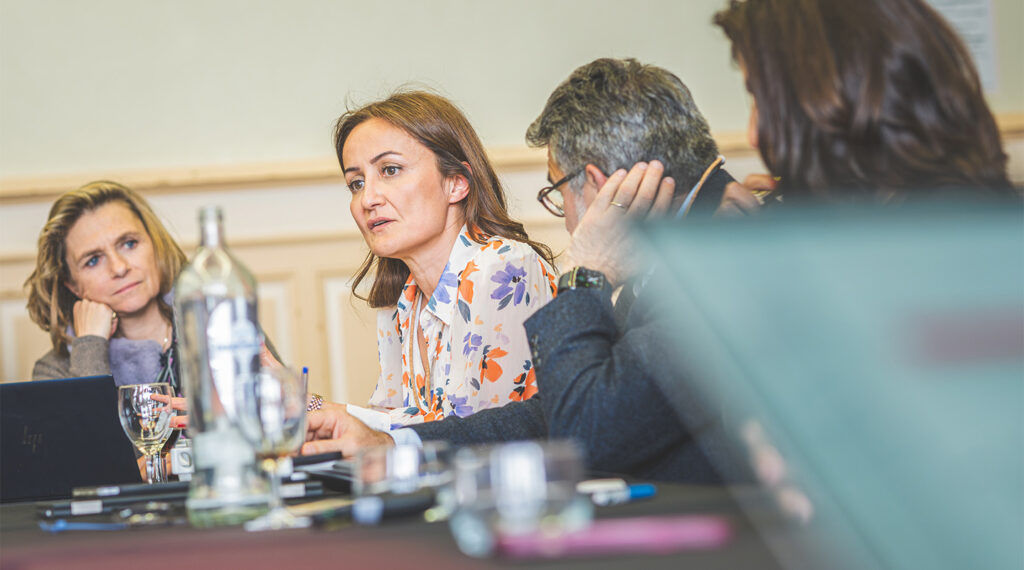Why serving on Philea’s NGC has been one of the most rewarding experiences of my career

Reflections after two terms as Chair of the Nomination and Governance Committee
After four years of service, it feels like the right moment to pause, take a breath and reflect. What I see fills me with pride: Philea has taken an extraordinary leap forward and being part of this transformation through the Nomination and Governance Committee (NGC) has been one of the most meaningful experiences of my professional life.
When Philea was founded, we were building something new – a governance structure from scratch. This came with excitement, complexity and responsibility. Yet as NGC members, we stepped into this challenge with courage and delivered results that truly strengthened the foundation of our organisation.
Across my two terms as Chair, we welcomed 115 new members into our network and contributed to major improvements in Philea’s membership and governance architecture. Looking back, I feel deeply grateful for the role we played in shaping into what Philea is today – and what it can become tomorrow.
From EFC’s broad council to Philea’s three specific governance bodies – a better system for a stronger future
Those who remember the European Foundation Centre (EFC) era will recall the Governing Council of 30 members. I used to serve in this council as well. But I felt influencing decisions in a two-hour meeting was very challenging for anyone outside the small management committee of seven members.
With Philea, a more efficient and participatory governance system with three bodies was introduced – the Board of Directors, the NGC and the Advisory Committee. This shift created a better division of tasks amongst governance bodies, more defined functions and agreed ways of working, and an emphasis on collaborative leadership.
What it means to serve on the NGC – and why it matters
1. Playing a strategic role in shaping philanthropy’s future in Europe
A strong Philea – today and tomorrow – requires both a strong membership base and strong governance. The NGC has a direct impact on both.
2. Advancing diversity, inclusion and a more representative philanthropy network
- Philea developed a membership dashboard which enabled us, as the NGC, to analyse the current composition of the network and opportunities for growth.
- We reassessed the membership eligibility criteria, grounding them in Philea’s statutes and translating them into clearer, more practical rules, which we developed by observing the diverse reality of philanthropy in Europe.
- We examined membership applications case by case, ensuring that new and emerging forms of philanthropy (e.g., community foundations, Enterprise foundations, donor-advised funds, umbrella funds…) were considered thoughtfully.
- We remained flexible where appropriate, yet firm where it mattered – for example, rejecting applicants unwilling to disclose financial information, protecting transparency as one of Philea’s core values.
- We refined the evaluation of election results, adding multiple diversity lenses (geography, gender, personal expertise, scope of work) on top of the voting results to ensure that governance bodies reflect the breadth of our ecosystem.
3. Having a voice in complex and meaningful questions
One of the most stimulating parts of NGC work is being able to influence critical, long-term issues.
Examples include:
- The role and engagement spectrum of Associate Members: We had an opportunity to join a broad consultation involving the Board, Thematic Network Chairs, cluster leads and the Advisory Committee. We discussed the results of the consultation and contributed to finetuning the strategy in the retreat in Riga together with the Board. This discussion is already bringing its results, with a more engaged Associate Membership as shown by our latest satisfaction survey.
- A deep discussion on whether the principle “using private resources for public good as the main activity” remains a relevant membership criterion, with more and more philanthropic organisations adding public funding to their income mix. Together with the Board, we reached a consensus: public funding is acceptable as long as the organisation uses resources independently, with clear governance, and long-term purpose.
4. Strengthening collaboration across the three governance bodies
While the three bodies began by working more independently, we gradually built a culture of collaboration with joint meetings, regular checkpoints, and shared decision-making. This has made governance more coherent, strategic and impactful and has helped develop a sound strategy for Philea, rooted in the insights of the broad pool of actors contributing to its design.
5. Personal growth, visibility and learning
Serving on the NGC has been a truly enriching experience. I have learned immensely from the thoughtful perspectives of brilliant colleagues. Some discussions were challenging — and that was a good thing. Healthy disagreements helped us reach better solutions.
I also appreciated the visibility and recognition that come with contributing to the governance of our European community.
A final word – and an invitation
Serving on the NGC requires time, commitment and curiosity. But it is also deeply rewarding.
There are still many questions to answer, many new members to welcome, and many brilliant colleagues who can enrich Philea’s future governance.
If you are passionate about philanthropy, if you care about building a resilient and inclusive ecosystem, and if you want to shape the future of Philea: this is your moment.
Put yourself forward.
Your voice matters.
And good luck in the elections.
Authors

